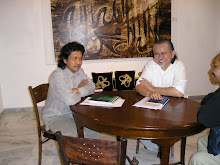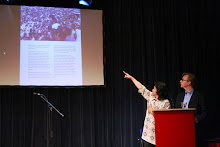During 2006 there was a lengthy polemic in Indonesia between traditional conservatives and more liberal groups over the perceived rise in pornography in Indonesia and its harmful impact on society. Playboy magazine had been published in Indonesia and had become the target of ire and protest. Demonstrations were held by groups both prop and contra a new draft bill on anti-pornography. Emha also joined the debate. Following is a translation of a text he wrote for consideration:
The Draft Anti-Pornography Bill
Based on discussions in Melbourne and Canberra
By Emha Ainun Nadjib
I propose that the implementation of the Draft Anti-Pornography Bill be cancelled or delayed for at least two years based on the following considerations, in order to give as wide an opportunity as possible for a full public discourse involving all groups and layers of society. There are many reasons for such a postponement. Here are some:
Among groups I’ve met in Jakarta, Yogyakarta, Surabaya as well as from far-flung areas such as Mataram, Mamuju and cities in Kalimantan and Sumatra, I find that of groups both pro and contra the bill, they have already taken concrete positions, even held demonstrations, without having read the text of the bill. This includes even members of provincial parliaments and local government officers.
According to the social and ideological map of Indonesia, the emergence of this bill has become a sort of time bomb. Like it or not, the implementation of the bill will be accompanied by explosive social unrest. There are many non-conducive situations which make this ‘social explosion’ likely. Following are a number of them:
An Anti-Pornography Bill to do what? To kill a snake with a bomb? The prime target of the bill is the media and television. Actually, a simpler and more effective way of addressing this could be found, for example via considering the need for a censorship body. Even the USA and Singapore have policies and their governments have the authority to limit the Press, which function just as a censorship body would.
The general public does not understand that failure to support the draft Anti-Pornography Bill is not the same as being ‘pro pornography or pro porno-acts’ just as those who claim to support the passage of the bill are not necessarily ‘anti pornography and anti porno-acts’. The problem and its context is not a simple one.Furthermore, the supporters of the bill fail to realise that a number of the bill’s clauses will impact on them just as they would on those who oppose the bill. Implementation could serve to restrict the opportunities for pornography and porno-acts to their own industries.
If the bill is passed, it would hold a mirror to a failure in public education and the capacity of the people to become an important element in the morality of their own national culture. A number of issues tied to pornography and porno-acts perhaps require legislation, but a number of others are best left to the prevailing mechanisms of social control of the people themselves.
There are a number of examples of ‘popular moral control’ such as that expressed by Novia (Kolapaking): “To refrain from pornography and porno-acts I do not need legislation. Nor do I want those things controlled by laws, because, those things violate my own right to human self-awareness. In order for me not to steal or hurt another person and so on a person requires only a sound mind and the capacity of love for his or her fellows, even if on this earth there is no Religion or Holy Book.”
In Islam itself, the Al Qur’an stipulates a substantial amount of legal philosophy concerning truths or ‘goods’ which are RECOMMENDED (the level of morality), as well as others which are OBLIGATORY or FORBIDDEN (the level of law). Followers of Islam must apply INTERPRETATION or conduct research and discussions in order to understand the differences between these levels. For Muslims in Indonesia, that would be the main focus of the discussions during a two-year postponement period for public deliberations.
Most of these both pro and contra the bill have failed to note one clause in the bill in which the government has the right to decide whether something is pornographic, a porno-act or not. That which is indeed pornographic to the extent that it is a public danger can be declared by the authorities to be non-pornographic. On the other hand, that which is not pornographic can be declared by the government to be pornographic as a result of certain vested interests, financial for example.
The clauses of the bill still include much language of culture and morality rather than of law. The language of culture and morality is very flexible, relative and permissive and is open to the possibility of exploitation and manipulation. The legal terminology must be made firmer, stricter and more solid and must restrict the possibilities for exploitation and manipulation.
Translated by Ian L. Betts
Saturday, 15 August 2009
Subscribe to:
Post Comments (Atom)


.jpg)





No comments:
Post a Comment